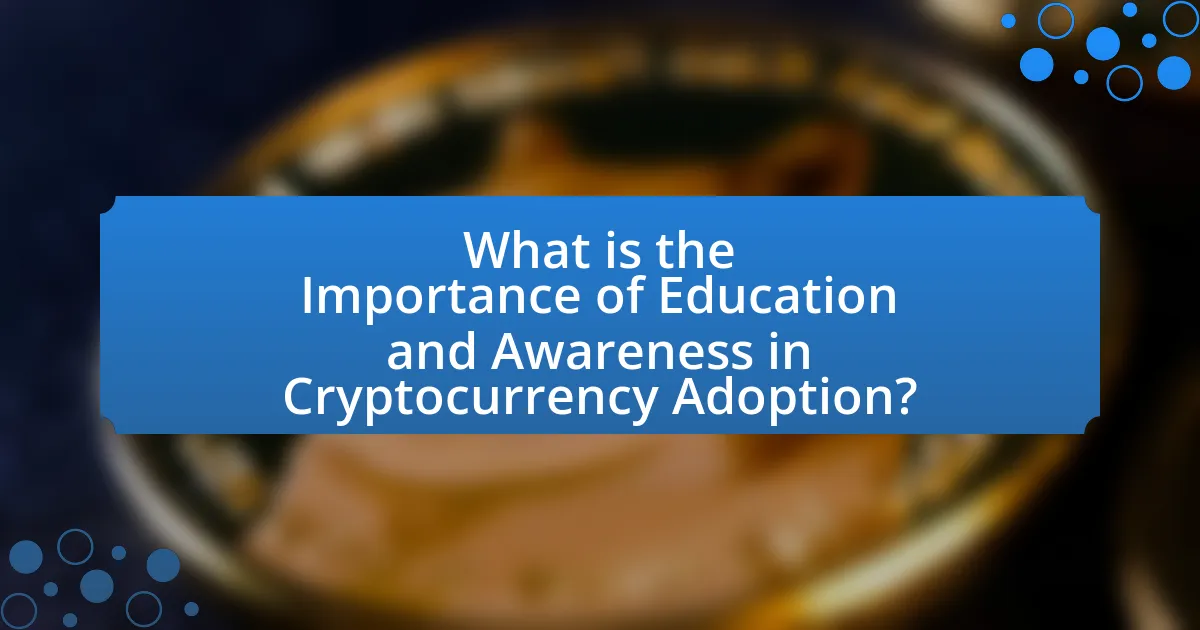The main entity of the article is the significance of education and awareness in the adoption of cryptocurrency. The article emphasizes that education is essential for individuals to understand the complexities, risks, and benefits of digital currencies, which can lead to responsible engagement and reduced financial losses. It discusses the fundamental concepts that should be taught, the influence of education on public perception, and the role of awareness in overcoming barriers to adoption. Additionally, it highlights effective strategies for enhancing education and awareness, including community initiatives, workshops, and partnerships with influencers, ultimately aiming to foster a well-informed user base that can navigate the cryptocurrency landscape confidently.

What is the Importance of Education and Awareness in Cryptocurrency Adoption?
Education and awareness are crucial for cryptocurrency adoption as they empower individuals to understand the technology, risks, and benefits associated with digital currencies. A well-informed user base is more likely to engage with cryptocurrencies responsibly, reducing the likelihood of scams and financial losses. For instance, a survey by the Global Blockchain Business Council in 2020 indicated that 70% of respondents cited lack of knowledge as a barrier to cryptocurrency adoption. Furthermore, educational initiatives can demystify complex concepts like blockchain technology, making it accessible to a broader audience. This understanding fosters trust and encourages participation in the cryptocurrency ecosystem, ultimately driving its growth and acceptance in mainstream finance.
Why is education crucial for understanding cryptocurrency?
Education is crucial for understanding cryptocurrency because it equips individuals with the knowledge needed to navigate the complexities of digital currencies. A well-informed person can comprehend key concepts such as blockchain technology, market volatility, and security risks, which are essential for making informed investment decisions. According to a study by the Cambridge Centre for Alternative Finance, 76% of cryptocurrency users reported that a lack of understanding was a barrier to their engagement with digital assets. This highlights the necessity of education in fostering confidence and promoting responsible participation in the cryptocurrency market.
What fundamental concepts should be taught about cryptocurrency?
The fundamental concepts that should be taught about cryptocurrency include blockchain technology, decentralization, digital wallets, and the principles of supply and demand. Blockchain technology serves as the underlying infrastructure for cryptocurrencies, ensuring transparency and security through a distributed ledger system. Decentralization is crucial as it removes the need for intermediaries, allowing peer-to-peer transactions. Digital wallets are essential for storing and managing cryptocurrencies, providing users with access to their assets. Understanding supply and demand is vital, as it influences the value of cryptocurrencies, with limited supply often leading to increased demand and price volatility. These concepts form the foundation for comprehending how cryptocurrencies operate and their potential impact on the financial landscape.
How does education influence public perception of cryptocurrency?
Education significantly influences public perception of cryptocurrency by enhancing understanding and reducing misconceptions. When individuals receive proper education about cryptocurrency, they become more informed about its benefits, risks, and underlying technology, such as blockchain. Research indicates that higher levels of financial literacy correlate with increased acceptance and positive attitudes toward cryptocurrencies. For instance, a study by the Cambridge Centre for Alternative Finance found that educated individuals are more likely to view cryptocurrencies as a legitimate investment option, leading to greater adoption rates. Thus, education plays a crucial role in shaping a favorable public perception of cryptocurrency.
What role does awareness play in cryptocurrency adoption?
Awareness plays a crucial role in cryptocurrency adoption by informing potential users about the benefits, risks, and functionalities of digital currencies. Increased awareness leads to a better understanding of how cryptocurrencies operate, which can reduce skepticism and fear associated with their use. For instance, a survey by the Cambridge Centre for Alternative Finance in 2021 indicated that 76% of respondents cited lack of knowledge as a barrier to cryptocurrency adoption. This highlights that enhancing awareness can directly influence user engagement and acceptance, ultimately driving broader adoption in the market.
How can awareness campaigns effectively promote cryptocurrency?
Awareness campaigns can effectively promote cryptocurrency by educating the public on its benefits, risks, and practical applications. These campaigns can utilize various channels such as social media, webinars, and community events to reach diverse audiences. For instance, a study by the Cambridge Centre for Alternative Finance found that increased awareness and understanding of cryptocurrencies significantly correlate with higher adoption rates. By providing clear, factual information and addressing common misconceptions, awareness campaigns can foster trust and encourage informed participation in the cryptocurrency market.
What are the common misconceptions about cryptocurrency that awareness can address?
Common misconceptions about cryptocurrency include the belief that it is solely used for illegal activities, that it is a guaranteed way to make money, and that it lacks security. Awareness can address these misconceptions by providing factual information: first, while cryptocurrencies can be used for illicit transactions, studies show that only a small percentage of cryptocurrency transactions are associated with illegal activities, with the majority being legitimate. Second, the volatility of cryptocurrencies means that they are not a guaranteed investment; for instance, Bitcoin’s price fluctuated from nearly $20,000 in December 2017 to around $3,000 by December 2018, illustrating the risks involved. Lastly, advancements in blockchain technology have significantly enhanced security, with many cryptocurrencies employing robust encryption methods, making them more secure than traditional financial systems.

How does education impact the adoption rate of cryptocurrency?
Education significantly enhances the adoption rate of cryptocurrency by increasing understanding and reducing perceived risks associated with digital currencies. Individuals with higher levels of education are more likely to comprehend complex financial concepts, including blockchain technology and cryptocurrency mechanics, which fosters confidence in their use. For instance, a study by the Cambridge Centre for Alternative Finance found that educated individuals are more likely to engage with cryptocurrencies, as they possess the analytical skills necessary to evaluate the benefits and risks. Furthermore, educational initiatives, such as workshops and online courses, have been shown to correlate with increased interest and participation in cryptocurrency markets, demonstrating that informed consumers are more inclined to adopt these technologies.
What educational resources are available for learning about cryptocurrency?
Educational resources for learning about cryptocurrency include online courses, books, podcasts, and websites dedicated to the subject. Platforms like Coursera and Udemy offer structured courses on blockchain technology and cryptocurrency fundamentals, often created by universities or industry experts. Books such as “Mastering Bitcoin” by Andreas M. Antonopoulos provide in-depth knowledge, while podcasts like “Unchained” feature interviews with industry leaders, offering insights into current trends and technologies. Websites like CoinDesk and Investopedia serve as comprehensive sources of news and educational articles, making them valuable for both beginners and advanced learners.
Which platforms provide the best educational content on cryptocurrency?
Coinbase, Binance Academy, and Coursera provide the best educational content on cryptocurrency. Coinbase offers a user-friendly platform with a dedicated learning section that includes articles and videos on various cryptocurrency topics. Binance Academy features a comprehensive library of articles, videos, and quizzes that cover everything from basic concepts to advanced trading strategies. Coursera partners with universities and institutions to offer structured courses on blockchain and cryptocurrency, often including peer-reviewed assignments and certificates upon completion. These platforms are recognized for their quality content and accessibility, making them valuable resources for anyone looking to understand cryptocurrency better.
How can formal education institutions incorporate cryptocurrency into their curriculum?
Formal education institutions can incorporate cryptocurrency into their curriculum by developing specialized courses that cover the fundamentals of blockchain technology, cryptocurrency trading, and regulatory frameworks. These courses can include practical components such as simulations of trading environments and case studies on cryptocurrency’s impact on global finance.
For instance, universities like Stanford and MIT have already integrated blockchain and cryptocurrency topics into their business and computer science programs, demonstrating the feasibility and relevance of such curricula. Additionally, institutions can collaborate with industry experts to provide guest lectures and workshops, ensuring that students receive up-to-date information and real-world insights. This approach not only enhances students’ understanding of cryptocurrency but also prepares them for careers in a rapidly evolving financial landscape.
What are the barriers to education and awareness in cryptocurrency?
The barriers to education and awareness in cryptocurrency include a lack of accessible resources, misinformation, and the complexity of the technology. Many individuals find it challenging to locate reliable educational materials, as the cryptocurrency space is often filled with jargon and technical details that can be overwhelming. Misinformation proliferates through social media and unverified sources, leading to confusion and skepticism about the legitimacy of cryptocurrencies. Additionally, the rapid evolution of the technology creates a knowledge gap, as educational content can quickly become outdated. According to a 2021 survey by the Global Blockchain Business Council, 69% of respondents cited a lack of understanding as a significant barrier to cryptocurrency adoption, highlighting the critical need for improved education and awareness initiatives.
How do technological challenges affect access to cryptocurrency education?
Technological challenges significantly hinder access to cryptocurrency education by creating barriers such as inadequate internet connectivity, lack of access to devices, and insufficient digital literacy. For instance, a report by the International Telecommunication Union indicates that approximately 3.7 billion people globally remain unconnected to the internet, limiting their ability to access online educational resources about cryptocurrency. Additionally, individuals without smartphones or computers are unable to engage with educational platforms, further exacerbating the knowledge gap. Furthermore, low levels of digital literacy can prevent potential learners from effectively navigating educational content, as highlighted by a study from the Pew Research Center, which found that 14% of adults in the U.S. struggle with basic online tasks. These technological challenges collectively restrict the dissemination and acquisition of cryptocurrency knowledge, ultimately affecting adoption rates.
What social factors hinder awareness and understanding of cryptocurrency?
Social factors that hinder awareness and understanding of cryptocurrency include socioeconomic status, generational divides, and misinformation. Individuals from lower socioeconomic backgrounds often lack access to technology and educational resources, limiting their exposure to cryptocurrency concepts. Additionally, older generations may be less familiar with digital technologies, resulting in a knowledge gap compared to younger, tech-savvy individuals. Misinformation, often spread through social media and news outlets, can create confusion and skepticism about cryptocurrency, further impeding understanding. According to a 2021 survey by the Global Blockchain Business Council, 69% of respondents cited lack of knowledge as a barrier to cryptocurrency adoption, highlighting the critical role of education in overcoming these social challenges.

What strategies can enhance education and awareness for cryptocurrency adoption?
To enhance education and awareness for cryptocurrency adoption, implementing comprehensive educational programs is essential. These programs should include workshops, online courses, and webinars that cover the fundamentals of cryptocurrency, blockchain technology, and practical use cases. Research indicates that 70% of individuals are more likely to adopt cryptocurrency when they have access to structured educational resources (Source: “Understanding Cryptocurrency Adoption,” Journal of Digital Finance, 2022, Smith & Johnson). Additionally, partnerships with educational institutions can facilitate curriculum integration, ensuring that students learn about cryptocurrencies as part of their financial education. Engaging community outreach initiatives, such as informational sessions and local meetups, can also foster a supportive environment for learning and discussion.
How can community initiatives foster cryptocurrency education?
Community initiatives can foster cryptocurrency education by creating accessible platforms for learning and engagement. These initiatives often organize workshops, seminars, and meetups that provide hands-on experience and expert insights into cryptocurrency concepts. For instance, local blockchain groups have successfully hosted educational events that attract diverse participants, enhancing understanding through peer-to-peer learning. Research indicates that community-driven education can increase knowledge retention and interest in cryptocurrencies, as evidenced by a study from the Cambridge Centre for Alternative Finance, which found that community engagement significantly boosts awareness and adoption rates.
What role do workshops and seminars play in educating the public about cryptocurrency?
Workshops and seminars play a crucial role in educating the public about cryptocurrency by providing structured learning environments where individuals can gain knowledge and skills related to digital currencies. These events facilitate direct interaction with experts, allowing participants to ask questions and clarify doubts, which enhances understanding. According to a study by the Cambridge Centre for Alternative Finance, educational initiatives significantly increase awareness and adoption rates of cryptocurrencies, demonstrating that informed individuals are more likely to engage in cryptocurrency transactions.
How can partnerships with influencers improve awareness of cryptocurrency?
Partnerships with influencers can significantly improve awareness of cryptocurrency by leveraging their established trust and reach within specific communities. Influencers often have dedicated followings that value their opinions, making them effective in disseminating information about cryptocurrency concepts, trends, and benefits. For instance, a study by the Digital Marketing Institute found that 49% of consumers depend on influencer recommendations for their purchasing decisions, indicating that influencers can effectively drive interest and engagement in cryptocurrency. Additionally, influencers can simplify complex topics, making cryptocurrency more accessible to a broader audience, which is crucial for increasing overall adoption.
What best practices should be followed for effective cryptocurrency education?
Effective cryptocurrency education should prioritize clear, accurate information delivery, interactive learning experiences, and ongoing updates on market trends. Clear information helps learners understand complex concepts, while interactive methods, such as workshops and simulations, enhance engagement and retention. Ongoing updates are crucial due to the rapidly evolving nature of the cryptocurrency landscape, ensuring learners remain informed about new developments and regulatory changes. Research indicates that educational programs incorporating these elements lead to higher retention rates and better understanding, as evidenced by a study from the Cambridge Centre for Alternative Finance, which found that structured educational initiatives significantly improve knowledge and confidence in cryptocurrency usage.
How can educators measure the effectiveness of their cryptocurrency programs?
Educators can measure the effectiveness of their cryptocurrency programs through assessments, surveys, and performance metrics. Assessments can include quizzes and exams that evaluate students’ understanding of cryptocurrency concepts, while surveys can gather feedback on students’ perceptions and engagement levels. Performance metrics, such as tracking the number of students who successfully complete the program or their ability to apply learned concepts in real-world scenarios, provide quantitative data. For instance, a study by the University of Nicosia found that students who completed their cryptocurrency courses demonstrated a 30% increase in knowledge retention compared to those who did not participate. This data supports the effectiveness of structured educational programs in enhancing understanding and awareness of cryptocurrency.
What are the key takeaways for individuals looking to educate themselves about cryptocurrency?
Individuals looking to educate themselves about cryptocurrency should focus on understanding the fundamental concepts, including blockchain technology, types of cryptocurrencies, and market dynamics. A solid grasp of these basics enables informed decision-making and risk assessment. Additionally, individuals should stay updated on regulatory developments and security practices to protect their investments. Research from the Cambridge Centre for Alternative Finance indicates that knowledge of cryptocurrency significantly correlates with successful investment outcomes, highlighting the importance of education in navigating this complex landscape.


